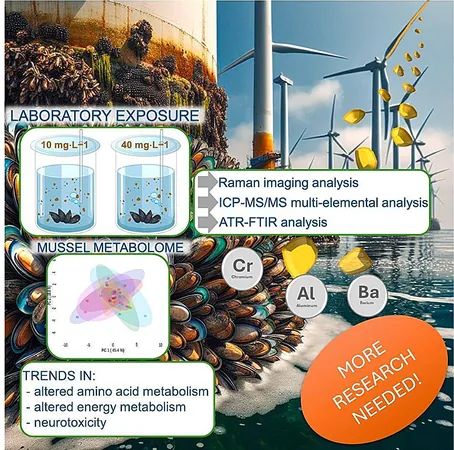
Shocking Study Reveals Hidden Risks of Offshore Wind Farm Emissions on Blue Mussels!
2024-12-18
Author: Li
Introduction
In a groundbreaking study led by the Alfred Wegener Institute, researchers are sounding the alarm about the environmental impact of offshore wind farms, particularly concerning blue mussels – a vital species under investigation for potential aquaculture programs alongside energy production.
Emissions from Wind Turbines
After enduring harsh marine conditions over the years, the rotor blades of wind turbines suffer from significant wear, leading to the release of harmful particle emissions into the ocean. These particles are not just insignificant debris; they contain troubling quantities of metals that may pose serious risks to marine life.
Experiment with Blue Mussels
The scientists conducted a pivotal experiment where they ground rotor blade material to a size that blue mussels could ingest. "We subjected the mussels to various concentrations of these particles and tracked their absorption over defined exposure periods," explained Dr. Gisela Lannig, the lead researcher and eco-physiologist at AWI. The findings, published in *Science of The Total Environment*, show a concerning trend: the mussels demonstrated moderate to significant absorption of metals, including barium and chromium.
Health Implications for Mussels
Dr. Daria Bedulina, another eco-physiologist involved in the project, reported, "We orchestrated a worst-case exposure scenario, with mussels facing high particle concentrations for up to 14 days. The findings suggest potential impacts on their neuroendocrine and metabolic systems." While the physiological assessments yielded inconsistent results, the metabolic alterations observed raise alarms about the possible short-term repercussions on these marine creatures.
Collaboration and Research Significance
Collaborating with the AWI, researchers from the Helmholtz Center Hereon and the Fraunhofer Institute for Wind Energy Systems contributed crucial insights and materials used in this extensive study. Their collective effort underscores the need for a greater understanding of the anthropogenic pressures introduced by the expansion of offshore wind parks.
Ecological Importance of Blue Mussels
But what does this mean for the future of these wind farms? Given that blue mussels play a crucial role in coastal ecosystems — serving as habitats and promoting marine biodiversity while filtering water — the potential for harmful particle accumulation demands urgent attention.
Call to Action
Dr. Lannig cautions: "As we explore the viability of using offshore wind parks for mussel breeding intended for human consumption, thorough research combining controlled laboratory experiments and field studies is essential. We must be absolutely certain about the environmental and health implications."
Conclusion
The call to action is clear: comprehensive short-term and long-term studies are crucial to assess the full extent of the risks posed by offshore wind emissions to marine life and ecosystems. As we strive for renewable energy and innovative aquaculture solutions, this research represents a necessary step toward safeguarding both our environment and public health.
Final Thoughts
Is the future of offshore wind energy worth the potential ecological costs? Only time and further research will tell. Stay tuned as we continue to explore these pressing environmental issues!


 Brasil (PT)
Brasil (PT)
 Canada (EN)
Canada (EN)
 Chile (ES)
Chile (ES)
 España (ES)
España (ES)
 France (FR)
France (FR)
 Hong Kong (EN)
Hong Kong (EN)
 Italia (IT)
Italia (IT)
 日本 (JA)
日本 (JA)
 Magyarország (HU)
Magyarország (HU)
 Norge (NO)
Norge (NO)
 Polska (PL)
Polska (PL)
 Schweiz (DE)
Schweiz (DE)
 Singapore (EN)
Singapore (EN)
 Sverige (SV)
Sverige (SV)
 Suomi (FI)
Suomi (FI)
 Türkiye (TR)
Türkiye (TR)